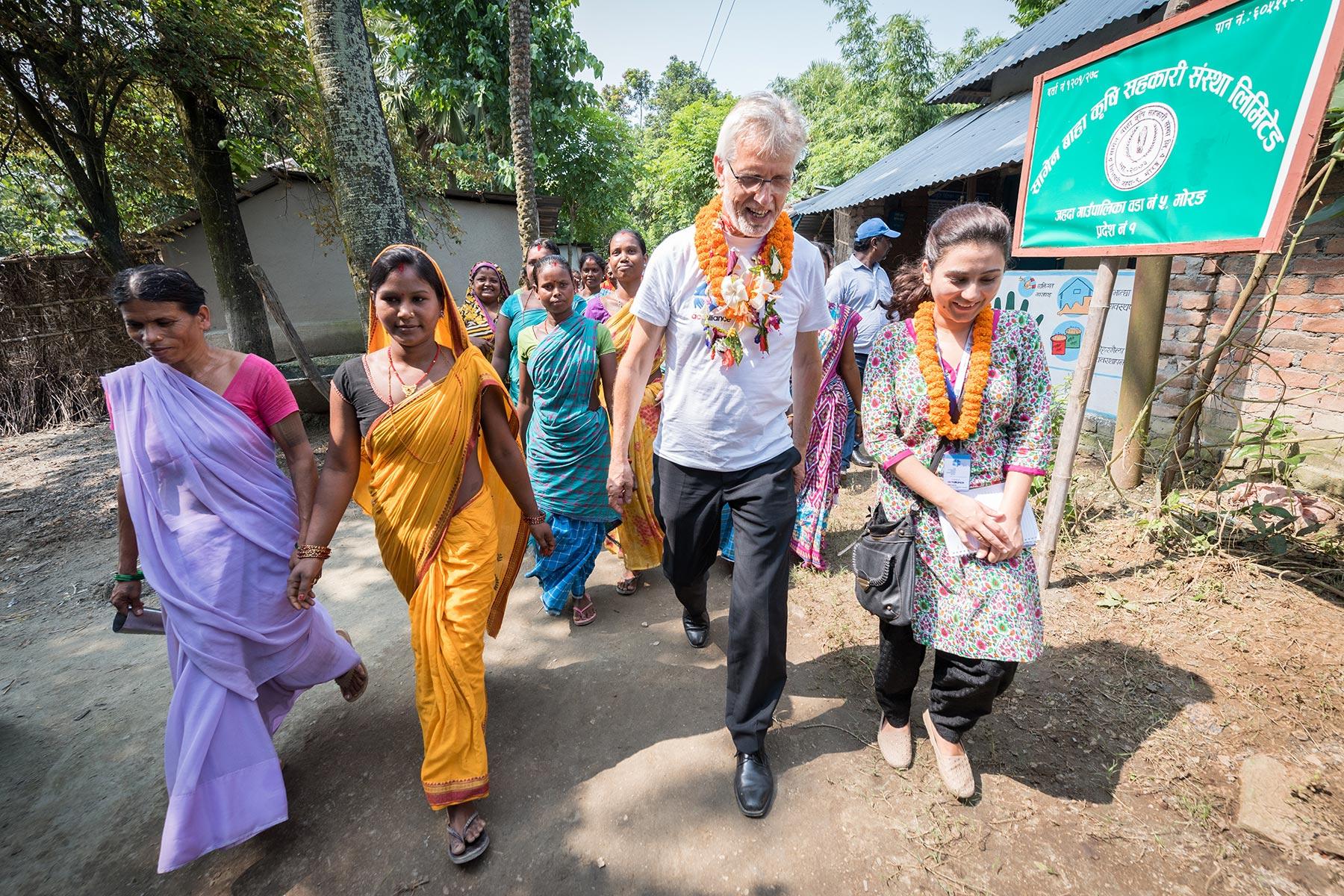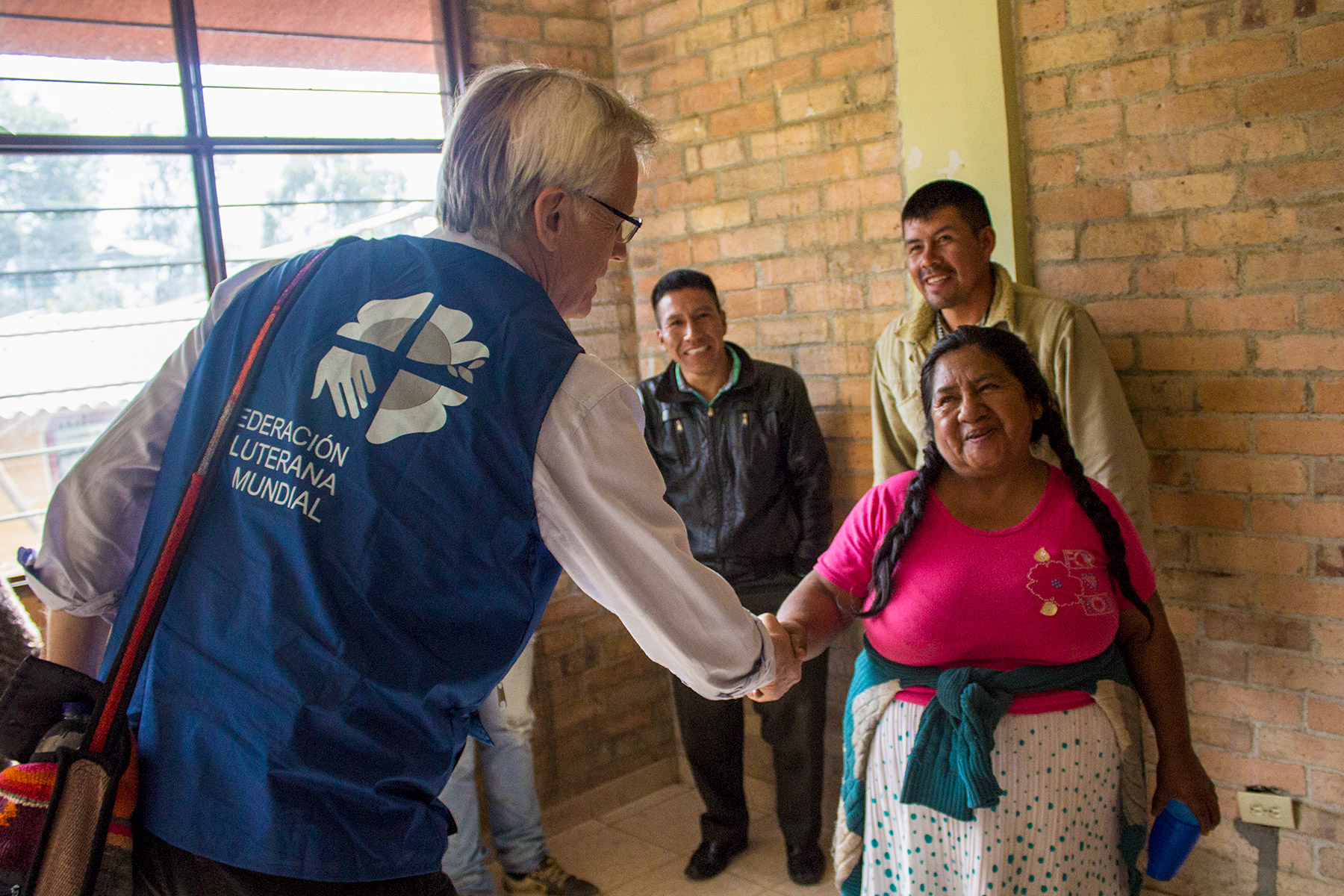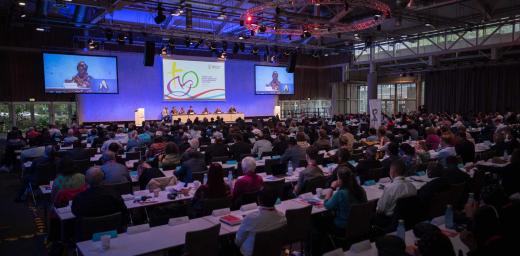Passion for the world: in conversation with Martin Junge

Lutheran World Federation General Secretary Rev. Dr Martin Junge visits a community inhabited by Santal and Dalit (Musahar) people in Nepal. The community is supported by the Nepal Evangelical Lutheran Church and LWF World Service. Photo: LWF/Albin Hillert
LWF’s outgoing General Secretary reflects on the life-saving work to protect, support, advocate and empower
(LWI) - For the Lutheran World Federation (LWF), diakonia and advocacy - or service to neighbors in need and work to change unjust structures - are two sides of the same coin, says outgoing General Secretary, Rev. Dr Martin Junge.
In the second part of a wide-ranging interview, he reflects on the work and impact of the LWF’s work for justice and dignity worldwide. Junge quotes the words of theologian and pastor Dietrich Bonhoeffer: “We are not to simply bandage the wounds of victims beneath the wheels of injustice, we are to drive a spoke into the wheel itself.”
Recalling visits to refugee camps in Africa, earthquake survivors in Asia or peace communities in Latin America, the LWF leader notes that the vocation to serve refugees was at the heart of the LWF’s foundation in 1947. “The imperative of being out in the world, of service to neighbor, of faith in action,” he says, continues to define “in many ways, who we are as a global communion of churches today.”
Let’s start by looking back to the way that vision of service to neighbor was formulated at the founding Assembly in the wake of World War II:
One of the first decisions that LWF member churches took, when they came together in Lund, was to respond to the plight of refugees. It is estimated that in 1947 some 50 million people on European soil had been forcefully displaced. When Lutheran churches met together that year, they understood that their coming together needed to become a gift of support, of compassion, of justice for people looking for a safe place. That’s a key part of the story of how the LWF started, with this joint instrument of member churches, now known as World Service, mandated to work at a global level in situations of humanitarian need with a very strong focus on protection of refugees.
That vision remains at the heart of the LWF today, doesn’t it?
Yes, I’m grateful that we have not lost this sense of vocation. Called as member churches to deepen our relationships as we participate in God’s mission always takes us to the outside, particularly to those people needing us most. And yes, we are doing that until this very day with continuous commitment globally. This defines, in many ways, who we are as a global communion of churches.
The LWF works closely with the United Nations High Commissioner for Refugees (UNHCR) and other UN agencies, as well as with ecumenical and interfaith partners too?
Yes, the LWF is one of the largest faith-based implementing partners of UNHCR and recently signed a new Memorandum of Understanding, renewing our commitment to continuing our joint work in this field.
We are very grateful for our strong network of partners, including institutions within our own global communion, in particular diaconal structures, which see in the LWF World Service their instrument or their partner for global action. Ecumenically, we have partnerships including our growing relationship with Caritas Internationalis, but also across faith communities, for instance cooperating with Islamic Relief Worldwide as we share similar faith commitments - people of faith for people in need.
How difficult is it to maintain a balance between these two identities as a faith community and as a humanitarian organization?
I would say it is one and the same faith-based identity which calls us to come together, to witness and worship together, as well as to serve together. But this ministry of serving our neighbor comes with a high degree of specialization. It requires us to be committed to a whole set of policies and compliance frameworks such as child protection, procurement policy and other policies which need to be in place. There needs to be accountability, because serving people in situations of oppression and disadvantage creates a power asymmetry which can easily go wrong, if the right values are not respected and these policies are not in place. I’m very grateful that the LWF has such policies and knows how to implement them.
Through its humanitarian and development work, the LWF is serving communities in 27 countries around the world today: tell us about some of these places that you have visited?
It has always been very inspiring to see first-hand the work that we are doing. I remember when I visited Kenya’s Dadaab camps, that were holding more than 400.000 refugees when I was there, with the LWF being entrusted with camp management at that time. I am so thankful for all those on the ground and in the Communion Office who enabled us to deliver on our commitments there.
I visited Colombia, and saw how the LWF was contributing to the peace process, ensuring that former fighters could be reintegrated into society. I saw our work among the Afro-Colombian population, which has been systematically and structurally oppressed and marginalized, and witnessed the important work being done to empower them.
I visited Nepal and saw how the LWF was making such a very strong impact after the devastating earthquake, in cooperation with Islamic Relief Worldwide and Caritas Internationalis, among others. In Nepal, World Service and our member church have found a good way of cooperating with each other, acknowledging the specificities of the work of the global communion and that of the diaconal presence of the local church.
It is so inspiring to see the impact we are able to make in so many places and how being Lutheran is perceived as being a presence of justice, healing and service. I am really grateful to our staff who are so committed and, many times, take risks to be there with those communities, on behalf of Lutheran churches united in the LWF.

General Secretary Rev. Dr Martin Junge meets with Indigenous people of Pueblo Nuevo, Colombia. Photo: LWF Colombia/ Diego Álvarez
Sadly, it seems there are still no solutions in sight to the global refugee crisis?
It is devastating to receive statistics from UNHCR about the unprecedented numbers of people who are forcibly displaced by conflict and disasters, both natural or human-made and nowadays so much related to climate change. It worries me that indifference is growing. I see political commitment, as enshrined in the Geneva refugee convention, being undermined all over the world and I see that it is not an issue of resources. If the world was able, after World War II, to take care of 50 million refugees, why wouldn’t it be able to take care of 85 million today? It is a matter of political will, of understanding that human beings must receive protection and the obligations that result from international humanitarian laws that almost all countries have signed. We are facing a crisis of accountability, with unforeseeable consequences.
Hence, it is possible to address the needs of people seeking protection as they are forcibly displaced, but at the same time, we must look at the structural issues. How is it possible that there are no global mechanisms in place to resolve devastating conflicts like Syria or Yemen? I’m referring here to the urgently needed reform of the UN Security Council. I’m not knocking the UN, which has become so common lately: but we must remember that the Security Council can only be strong if States are prepared to strengthen it. And what about climate change? Are we just going to continue watching people needing to move away because parts of the world are getting too dry or the waters are rising too high? Do we just watch these numbers increase, or is there a way to address the root causes?
Advocacy for structural change, then, is as important as the day-to-day work of supporting those who need protection?
Yes, advocacy and diakonia come together. I remember Dietrich Bonhoeffer who spoke so powerfully of the need to put a spoke into the wheel that continues to crush people, while at the same time standing with people already being crushed by that wheel.
One of the contributions I think we bring to the table is that we have roots in local communities and we know the issues on the ground, while at same time, as a global communion, we have access to global structures where policy is being developed. This is why, in our work through Action for Justice, we speak of ‘local to global to local’ advocacy. This is our added value: our advocacy stems from our presence on the ground. I’m always pleased to see good examples of how our work, our participation in the UN’s Universal Periodic Review processes for example, has an impact, with faith-based organizations and governments working together to improve living conditions and access to justice for people on the ground.
This is particularly important in challenging situations such as the hospital that the LWF runs in Jerusalem for example?
The Augusta Victoria Hospital is a ministry that we hold as a global communion of churches and we understand its enormous importance - that’s why we’re committed to continue developing it. It is a highly specialized hospital treating cancer patients, treating kidney diseases and making an important contribution to the Palestinian health service sector overall. We work together with those whom we need to work with and this work stems from a vocation to serve those most in need. This is how we operate on the Mount of Olives and in so many other parts of the world where political contexts are at times demanding and challenging, but where we seek to be a constructive presence focused on people accessing their rights and dignity.
LWF is rooted in this vision of faith in action, but there are people who remain deeply suspicious of the motives of all faith-based organizations?
Yes, I think this is a suspicion that sometimes lingers. But I have to say that when it comes to global structures, within the UN and governments for instance, there has been a remarkable development in acknowledging both the role and the intentions of so-called Faith-Based-Organizations (FBO) like the LWF. I think both LWF World Service and our member churches are absolutely clear about their witness of service and transformation, inspired by the vision and hope in God’s kingdom.
You mentioned the problems of climate change which are increasingly in focus?
I will always remain deeply grateful to our LWF youth who have played a vital role in helping the global communion of Lutheran churches to understand the urgency of climate justice. Long before Greta Thunberg, the LWF has been grappling with the issue of intergenerational justice as one of the critical dimensions we’re dealing with here. For several years, we have been sending youth delegations to the different COP conferences and it was their leadership and their commitment which led us to deepen our engagement and our commitment, including the decision in 2015 not to invest in fossil fuels any more. We still need to do much more in a coordinated way, but I continue to see so much happening when I visit local churches.
The presiding bishop of the Evangelical Lutheran Church in Tanzania, wherever he goes, at the end of a visit he will ask to plant trees with young people. Following all confirmations and baptisms he will ask parents, as part of their commitment to the Christian faith, to plant trees and many thousands have already been planted. We know, of course, that tackling climate change takes more than planting trees, but we are also grateful for every tree planted by our member church in Tanzania, and in many other parts of the world. We are a tree-planting communion, thereby a communion with hope in the future.
As you look back at your time in office, what gives you most hope for the future of the LWF?
I think the LWF has a strong identity and a clear sense of purpose. Despite the challenges of the COVID pandemic, the LWF understands its calling to be a communion in this world and so has been able to shift gears and adapt to the new realities. I am confident that this commitment, this unity of purpose is an extremely important asset in this moment of change and of unprecedented global challenges.
What are your thoughts as you look ahead to the Assembly in 2023?
I’m very much looking forward to the Assembly. I find it extremely powerful that a church in a minority situation, the Evangelical Church of Lutheran Confession in Poland, is going to host us. This confirms the vision that our former LWF President Josiah Kibira (1977–1984) laid out when he said: In the LWF, there is no church which is so rich, so old in history and well-endowed with resources that it would not depend on others, and there is no church so new, with such scarce resources that it wouldn't have something to offer to others.
That vision is coming to fruition as we gather in Poland, a church in a minority situation, yet very active in its context and making big efforts to host us there. In the LWF we are on that journey, learning to meet and acknowledge each other as fully the church, based on how we understand church and unity according to our Lutheran confessions. Other similar examples abound and teach us a powerful lesson: a church doesn’t need to be big to make a difference; it is by making a difference that it is big. We should not get too busy counting numbers. Instead, we should remain busy recounting the powerful story of transformation that has entered into this world in the person of Jesus Christ.
We are coming with a good theme to the Assembly, ‘One Body, One Spirit, One Hope,’ that brings us together in a strong way and will be a powerful message in times of fragmentation. We are drawn together by the Gospel of Jesus Christ. Yes, we will have to grapple with differences, and find ways to understand each other, not just the languages we speak, but the different worlds we have in our heads and how they shape who we are as people and as churches. But our calling is there: to be churches together as a global communion. I’m looking forward to being a guest, with less responsibility, therefore, but equal joy and hope!
You started your own career as an Assembly steward in Brazil in 1990: what do you say to young people who are considering serving at the Krakow Assembly?
I remember we once had T-shirts made for stewards, saying ‘General Secretary in preparation’ and I can testify - it was not just a publicity stunt!
But my message to young people is simple: the LWF is also your place, this is also your LWF. We need you, the church needs young people, not just in thinking about its witness for tomorrow, but in shaping, right now, the face, the message and the witness of the church in our world today.
LWF/P. Hitchen
Part 2 of our in-depth interview with LWF’s outgoing General Secretary Rev. Dr Martin Junge who steps down from that role on 31 October 2021. A former president of the Evangelical Lutheran Church in Chile, he was the first Latin American to hold the post of General Secretary of the global communion of churches. He was elected by the LWF Council in 2009 and took office on 1 November 2010. He was appointed by the Council for a second term in 2017.





